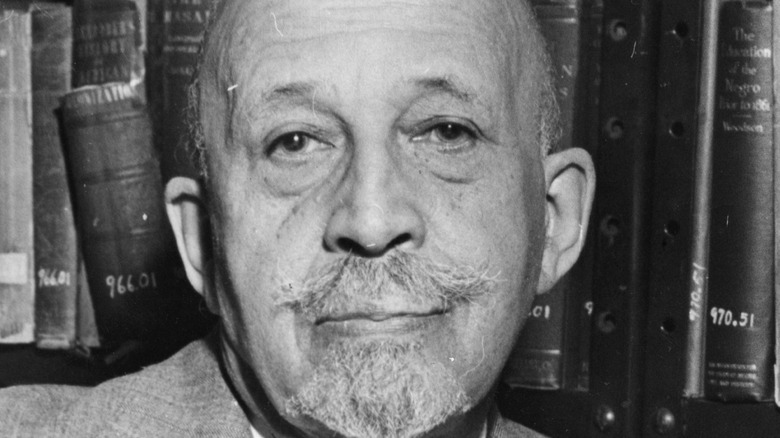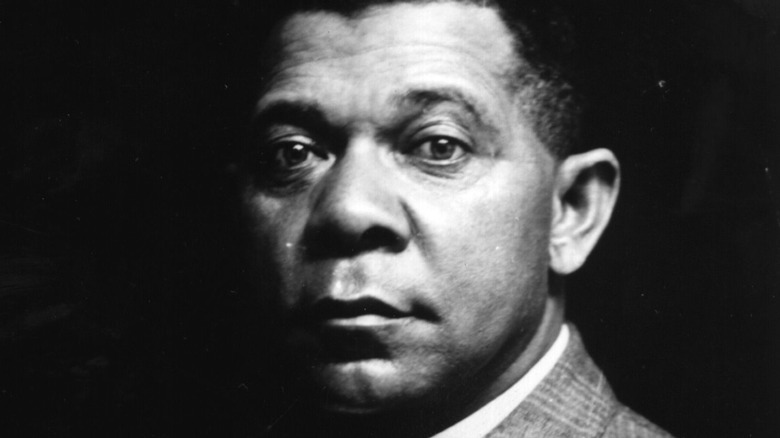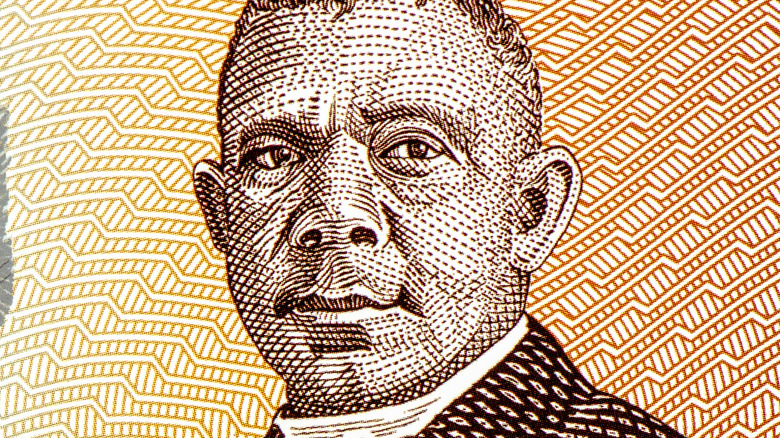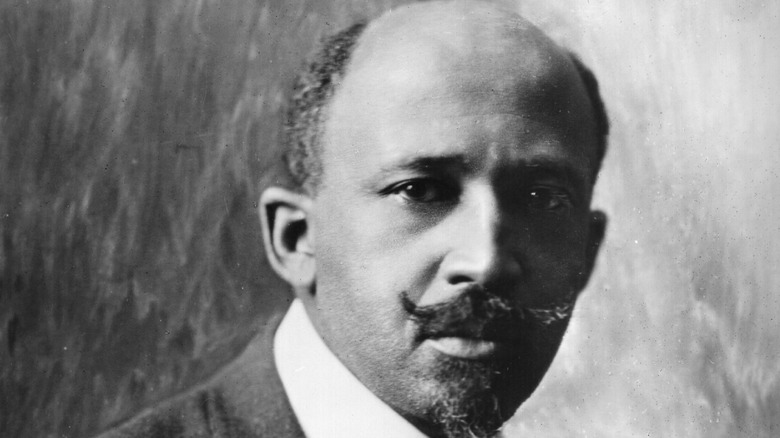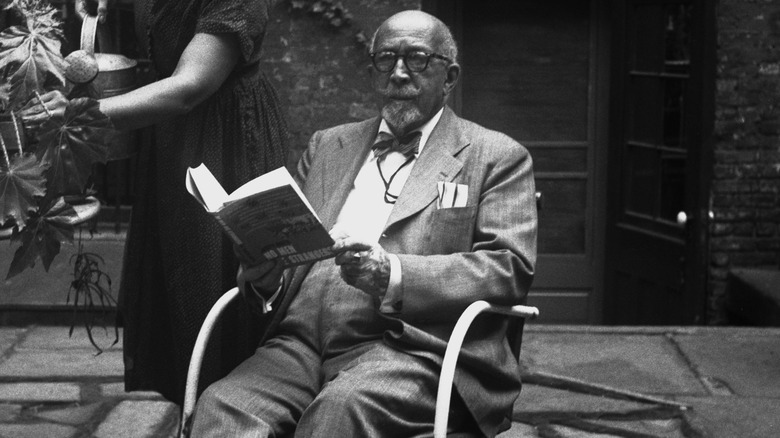A Look At The Conflict Between W.E.B. Du Bois And Booker T. Washington
When two people are the recognizable voices of something — either a company in a specific industry or even a social movement — a conflict is sometimes inevitable and right around the corner. This has even happened between some of our most revered activists and revolutionaries. As history has shown us, many prominent leaders have had a war of ideas with each other. During the early civil rights movement of the late 19th century, one of the leading Black voices of the time was Booker T. Washington — a formerly enslaved academic who co-founded Tuskegee University in Alabama. By the early 20th century, William Edward Burghardt Du Bois, or W.E.B. Du Bois, as he was better known, was also a rising figure. He co-founded the National Association for the Advancement of Colored People (NAACP), per Britannica.
The two men came from very different backgrounds, but at the core of their politics was the fight against the inequality Black people in America were faced with. However, their ideals would clash and their differing views on the best solutions for Black Americans led to one of the biggest intellectual disagreements.
The beginning of Washington's philosophy
Booker T. Washington was born in slavery on a plantation in Franklin County, Virginia, on April 5, 1856 (per Virginia History). Despite all the odds, as a young man, he earned an education at Hampton University in the nation's capital. He actually had a very self-sufficient mindset, having done such to obtain his education. In order to pay for his education at Hampton, Washington worked in the school's maintenance, says Biography.
It was likely that self-sufficiency that shaped his politics. One of Washington's mottos as head of Tuskegee University was encouraging Black students to find economic freedom through education and ownership via farming and other agricultural jobs accessible to Black people at the time. He believed that if others committed to working hard and showcasing that, it would help improve race relations and racism. After the Civil War, the Reconstruction era was a rough period, and Washington noted in his autobiography, "Up from Slavery," that many Black people were relying on the government for help. His answer to what Black people faced was going to school in order to learn how to navigate.
"Even then I had a strong feeling that what our people most needed was to get a foundation in education, industry, and property, and for this I felt that they could better afford to strive than for political preferment," wrote Washington (via Documents of the American South).
Washington's controversial speech
He shared that belief in a now famous speech called the Atlanta Compromise on September 18, 1895 (via Today in Georgia History). His address to a mostly white crowd at an event promoting Georgia's economy further pushed the idea that he believed that Black people should focus on striving for educational opportunities that taught them agricultural skills, and not rally for social changes and racial equality. He basically described it as a waste of time.
"The wisest among my race understand that the agitation of questions of social equality is the extremest folly, and that progress in the enjoyment of all the privileges that will come to us must be the result of severe and constant struggle rather than of artificial forcing," Washington said in his speech (via Rev).
Washington's idea is what some saw as assuaging white supremacy (back then and today). And even though he was praised for his speech, one of his biggest critics would come from Du Bois a few years after.
Another rising black voice appears
W.E.B. Du Bois was born in Great Barrington, Massachusetts, on February 23, 1868 (per Biography). He mostly grew up around white people as a child and didn't encounter Black people until he attended college in Nashville, Tennessee. While there, Du Bois came face-to-face with the harsh effects and reality of racism.
Du Bois later enrolled at Harvard University, where he earned his Ph.D. in 1895, becoming the first Black person to graduate from the institution with that degree. After his studies, he wrote about the racial inequities of Black people in America and became a premier sociologist and intellectual thinker of that time. Contrary to Washington, Du Bois believed in education beyond trade skills. He also held the opinion that Black people needed to advocate for their rights and have an educated class he called the Talented Tenth (via PBS). It pushed the idea that if 10 percent of the Black population was educated, they could free all Black Americans from the stronghold of white supremacy. The same year he graduated from Harvard would be the same year Washington delivered his controversial speech. And Du Bois had a lot to say about it a few years later. It was also when he expounded on his idea of the talented class of educated Black men.
The great debate between W.E.B. Du Bois and Booker T. Washington
In his 1903 book "The Soul of Black Folk," W.E.B. Du Bois unleashed a fervent response to Washington, fully critiquing not only his politics, but his character, too, in a dedicated essay to him, per History Matters. Du Bois surmised that education was the main solution, but also maintained that white society wasn't above critique. "We have no right to sit silently by while the inevitable seeds are sown for a harvest of disaster to our children, black and white. First, it is the duty of black men to judge the South discriminatingly," wrote Du Bois in the essay titled "Of Mr. Booker T. Washington and Others."
He blasted Washington and added that his ideology relieved white people of any responsibility of racial inequality in the South and the widespread disenfranchisement. "His doctrine has tended to make the whites, North and South, shift the burden of the Negro problem to the Negro's shoulders and stand aside as critical and rather pessimistic spectators; when in fact the burden belongs to the nation, and the hands of none of us are clean if we bend not our energies to righting these great wrongs," wrote Du Bois.
The debate between Booker T. Washington and W.E.B. Du Bois became a major discourse, and even became the subject of a popular poem written by poet Dudley Randall in 1969 (via Poetry Foundation).
